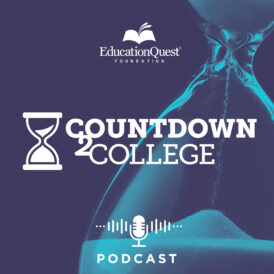
November 18, 2025 · Season 2 · Episode 16
How to Be the Main Character in Your College Essay
By Alex Jurgens & Gage
Staring at a blank doc trying to write about yourself? In this episode, Gage and Scholarships & Grants Specialist Alex Jurgens break down what actually makes an essay stand out, how personal to get without oversharing, when it’s okay to recycle essays, and how to use AI without losing your voice.
Writing a college or scholarship essay can feel daunting, but it’s also one of the best opportunities to show who you are beyond grades and test scores. In a recent Countdown2College interview, Alex Juergens, scholarship & grants specialist at EducationQuest Foundation, explained how students can use essays to highlight their personality, passions, and goals.
Why Essays Matter
Essays aren’t just busywork. Colleges use them to gain insight into a student’s personality beyond test scores and transcripts. Some ask for a general personal statement; others have specific prompts tied to their admissions process. Even colleges that don’t weigh essays heavily for admissions may use them when awarding scholarships or extra financial aid.
Scholarship programs especially rely on essays, and they’re often the highest-scored part of the application. That means a thoughtful, well-crafted essay can make a big difference.
Main Character Energy
You may have heard the phrase “main character energy.” In the context of essay writing, it simply means to tell your story. Your essay should highlight what matters to you, the experiences that shaped you, and what you’ve learned along the way. Consider your favorite character from a movie or series: they evolve, learn, and grow. Your essay should follow a similar arc—beginning, middle, end—with a clear takeaway about how you’ve changed or what you now understand.
What Stands Out
The strongest essays sound like the real you. Reviewers want an honest voice and a genuine story—not something overly polished or formal. Instead of writing, “I’m hardworking” or “I’m compassionate,” show it through a specific example. A detailed description helps readers imagine you in action and makes your essay much more engaging.
How Personal to Get
It’s okay—actually, encouraged—to be vulnerable. Sharing authentic experiences helps readers connect with you on a deeper level. But the key is choosing a story you’ve had time to reflect on. If you’re still in the middle of a difficult situation and haven’t gained perspective or learned something from it, it may not be the right topic yet. Essays shouldn’t feel like venting or trauma dumping; they should show growth, insight, and resilience.
Keep It Fresh
Many students try to fit everything they’ve done in high school into one essay, but that tends to feel like a résumé in paragraph form. A better approach is to choose one or two experiences that truly mattered to you. Discuss something you’re passionate about, a challenge you faced, or an issue in your community you care about. Zoom in on a single moment or conversation that reveals something important about you. Then, connect that experience to your goals for college or your future career.
Reusing Essays
Yes, you can repurpose essays. Using a personal statement as a base can save time, provided you edit it for each application. Every prompt is different, so always revise your essay to make sure you’re answering the question entirely.
Get a Second Pair of Eyes
Even if you’ve read your essay 20 times, you’ll still miss things. Ask someone with strong writing skills, such as an English teacher, to provide you with feedback. Choose someone who will be honest but supportive. A fresh set of eyes can help catch errors, unclear sentences, or places where your voice could be stronger.
Using AI Carefully
AI tools can help check grammar or rephrase awkward sentences, but they shouldn’t write your essay for you. Reviewers can usually tell when writing sounds artificial or overly polished. Your story should always come from you; AI should be a tool for proofreading, not a replacement for your voice.
When You’re Stuck
Staring at a blank page can be intimidating. One of the best things you can do is allow yourself to write a “bad first draft.” Free write your thoughts, even if they feel messy or uncertain. Journaling can also help you discover ideas worth expanding on. Once you’ve written something, you can shape it into a stronger draft. The first version is never the one you’ll submit, and that’s okay. The important thing is to be the main character in your story.
